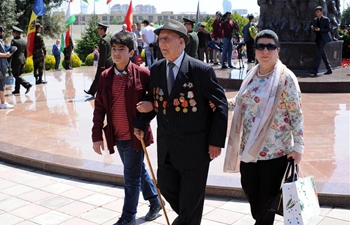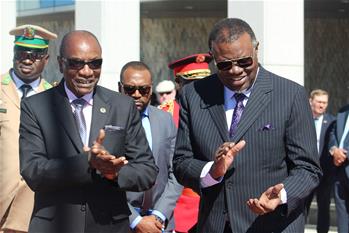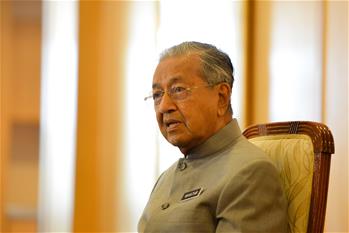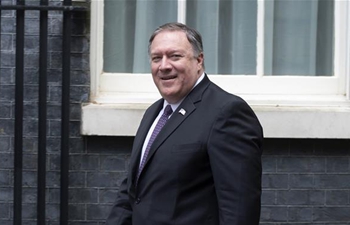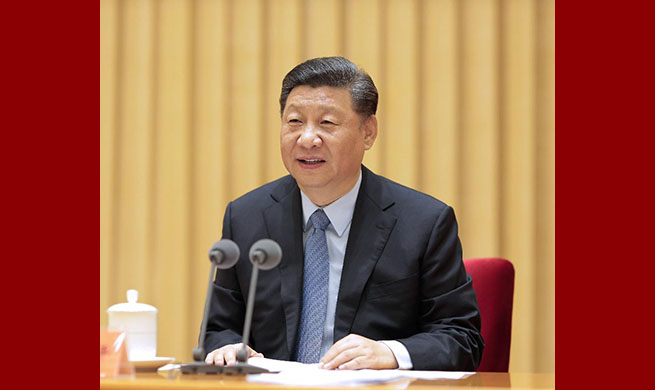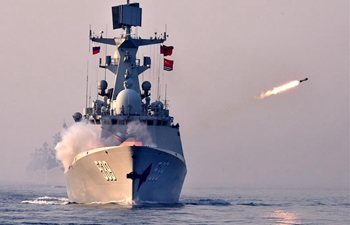ANKARA, May 9 (Xinhua) -- Turkey's currency on Thursday hit 6.24 against the U.S. dollar, the weakest level in eight months amid concerns over the re-run of Istanbul's mayoral election.
The lira trimmed some losses after the central bank announced it was suspending one-week repo auctions, which is a procedure aiming essentially to inject cash into the banking system, in a bid to shore up the currency, which, as of Thursday, lost 50 percent of its value in a year.
The Turkish central bank suspended unexpectedly one-weak repo auctions for an indefinite period of time amid fluctuations in currency rates, a move which has been considered by analysts as a backdoor hike in borrowing costs as the decision effectively raises the cost of funding by 150 basis points without an official increase in the benchmark interest rate.
"Considering the developments in financial markets, it has been decided to suspend the one-week repo auctions for a period of time," said a statement released by the central bank.
"There are also international concerns but this week's fluctuation is essentially triggered by uncertainty surrounding the Istanbul vote," said a financial expert to Xinhua on the condition of anonymity, predicting that this trend is largely expected to continue in upcoming days.
He added that "investors fear that the decision to renew the Istanbul election on June 23 will increase nearly two months of uncertainty over Turkey's plan to rebalance and stabilize economy."
Turkey has tumbled into a recession in late 2018, its first in a decade of strong growth, following a currency meltdown in the summer. The depreciation of the Turkish currency since then has reached 40 percent, despite government measures to prevent it.
The ties between Turkey and its NATO ally the United States have also soured due to the former's close cooperation with Russia over the purchase of S-400 defense missile systems, adding to tensions.
Interest rates on Turkey's benchmark 10-year lira bonds also climbed to 25.23 percent on Thursday while the main BIST100 stock index closed down to 1.76 percent, for a fourth consecutive day since the top electoral body decided to renew Istanbul elections on the basis of irregularities.
Credit default swaps, or the cost of insuring exposure to Turkish debt, spiked 11 basis points (bps) in one day to reach 483 bps, similar to levels seen ahead of Turkey's March 31 local elections.
After weeks of bitter disputes and appeals by President Recep Tayyip Erdogan's ruling Justice and Development Party (AKP) and its nationalist ally, Turkey's Supreme Election Council(YSK) ruled on Monday for a re-run of the Istanbul mayoral election, causing public outcry.
The original election was narrowly won by the opposition, the first in 25 years in the country's biggest city and economic hub, which accounts for a third of the emerging nation's economy.
And with a struggling economy, high inflation and unemployment, fresh tensions which are expected to rise during a new political campaign to win Istanbul, are the least wanted factors for the politically polarized country.
However, the public finances are still relatively strong and the country's economy is large and diversified, which are positive signs. Nevertheless, the external financing requirement of Turkey is significant, making it vulnerable to global investor sentiment and the new vote simply delays application of planned reforms.
Weaker lira is also making debt repayments more expensive as lenders are already struggling with nearly 30 billion U.S. dollars of restructuring.
And the new elections will trigger new expenses to finance a fresh campaign making Turkey's public finances even more fragile with new risks to macro stability, analysts said.




